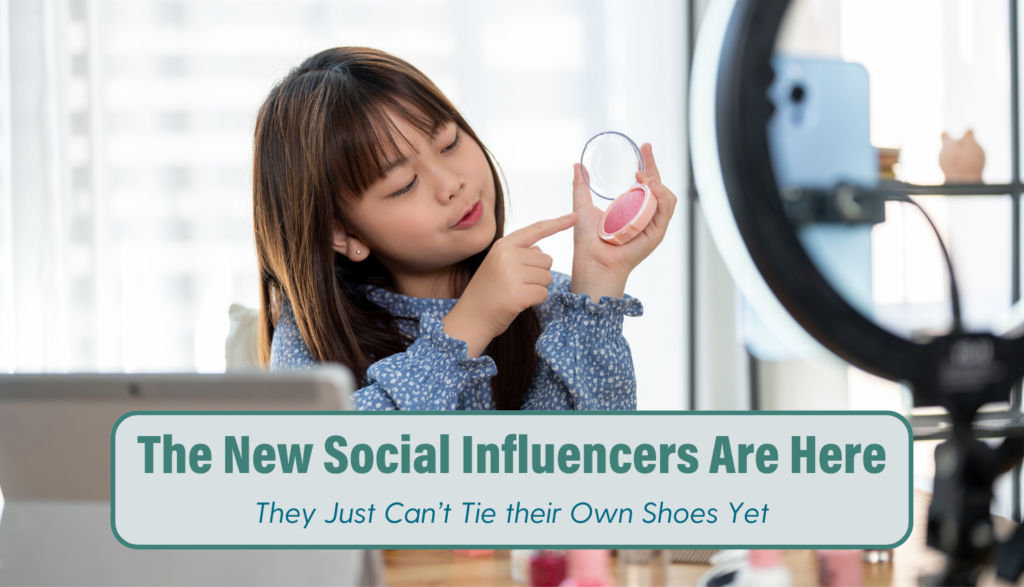There was a time, not all that long ago, when the Orwellian threat of Big Brother perpetually looking over our shoulder was a pressing societal concern. We worried “they” might be listening, watching and somehow manipulatively shaping our world, our desires, our actions!
But hey, that’s so yesterday.
Today’s world shapers are none other than our favorite online influencers. They’re not hidden behind our back but on the screen in our hand. It starts when an average somebody grabs our attention. They’re cute, funny or have some interest in common with us. And next thing you know, that familiar face and chuckle-worthy TikTok-YouTube-Instagram personality becomes the equivalent of a new bestie in this friendless, social-experiment world of ours.
Sure, you don’t really know them. But you know everything about them. I mean, hey, you use the same toothpaste. You wear the same brand of jeans. That’s what friends do, right?
Yeah.
Well, get ready, because the newest wave of influencers are hitting screens everywhere. And they have been gearing up for a while. The only drawback has been that some in this new bunch can barely pronounce the word “influencer.” Why? ‘Cause they’re still having a hard time with multisyllable words. There’s a big new force of “kidfluencers” hitting the scene and growing in leaps and bounds. (In more ways than one.)
A few years ago the New York Times posted an article about these youthful influencers, pointing to one young girl named Samia Ali who, the article said, “was an influencer before she could talk.” Her parents, influencers themselves, began chronicling Samia’s impending arrival, then plopped the little cutie in front of a camera as soon as possible. When the article was published, the already popular child influencer was four, and now Samia is nine and still going strong. She has advertising contracts with everything from Walmart to Mattel, hundreds of thousands of followers on various platforms and a net worth somewhere north of two million dollars.
Truthfully, though, Samia is only one of many, many, many young smiling faces ready to influence you and yours.
For instance, there’s Taytum and Oakley Fisher, adorable 7-year-old identical twins who talk, play, dance and sing for their 3.1 million followers. Alaïa McBroom is a 3-year-old who gives her fashion tips to 2.1 million Instagram followers. (Her big sis, Elle, is four years older and holds sway with 4.2 million Insta followers.) Then there are older statesmen such as Ryan Kaji who, at the ripe old age of 13, has 34 million YouTube subscribers who watch him unbox new toys and play around with family members in a regular stream of vids.
That stable of perfectly lit and well-filmed youngsters is growing. In some cases, the kids aren’t even born yet. They still haven’t made their first big curtain call on life, but they already have thousands of subscribers watching and waiting. All it takes is an eager mom or dad who want to set up some social media accounts and give breathless hints at just how adorable the little stars will soon be.
It all sounds kinda harmless and fun. The kids are having a great time. People online are enjoying the TikToks and Instas. The parents are getting strokes for having adorable children. Hey, they may even be living vicariously through their beloved, influencing starlets.
However, doesn’t this sort of stuff raise some uncomfortable questions, too? For example, who are these infant influencers supposed to be influencing? Why would anybody “follow” a preborn child? Why are adults—since kiddos aren’t old enough to have a social media account—glued to images of playing tykes?
For that matter, why are parents putting their kids in front of a camera in a work week grind? Some of the more popular kidfluencers have one or more siblings making their own Insta reels and TikToks regularly, too. So why are their moms and pops giving that a big thumbs up? Is it just the siren’s call of a little corporate sponsorship cash? It’s certainly tempting, I’m sure. But that, again, raises some problematic questions.
There is very little control in place for the kidfluencer money earned. Young actors in Hollywood have the Coogan Act in place that demands that a portion of youths’ earnings be placed in a sealed savings account. But there isn’t anything like that for kidfluencers.
More importantly, what about the kids themselves? I mean, the joy of being praised for your videos as a teen or twentysomething may seem fun and problem free (although many “retired” YouTubers would beg to differ), but is that the same for a grinning four-year-old in lip gloss and eye shadow? I’m not so sure.
Let’s face it, young kids can’t control where their images go or who’s using them. And when a kid is always “performing” for the camera, how does that affect them? When a child’s only concept of self-esteem and value starts boiling down to how well that last video turned out, things might soon be problematic.
Now, I’m not suggesting that kids opening toys on YouTube is evil or bad. And I’m not saying that parents should stop posting videos and pictures of their lovely children. But I am asking about the healthiness of the choices we’re making as a society. And, for that matter, perhaps we all should be asking questions about how we use and/or support social media.
It may not be the threat of Big Brother, but when it comes to the well-being of children, the wrong social media choices could lead to a Big Cost.







2 Responses
There is absolutely nothing wrong with just keeping children away from social media and letting them be children for a little while longer.
As soon as I saw the title, I thought of Ryan Kaji (not his actual surname) from “Ryan’s World,” whose parents are extreeeeeeemely wealthy and I have no idea how much of that is actually going to go to him and benefit him once he’s of age.